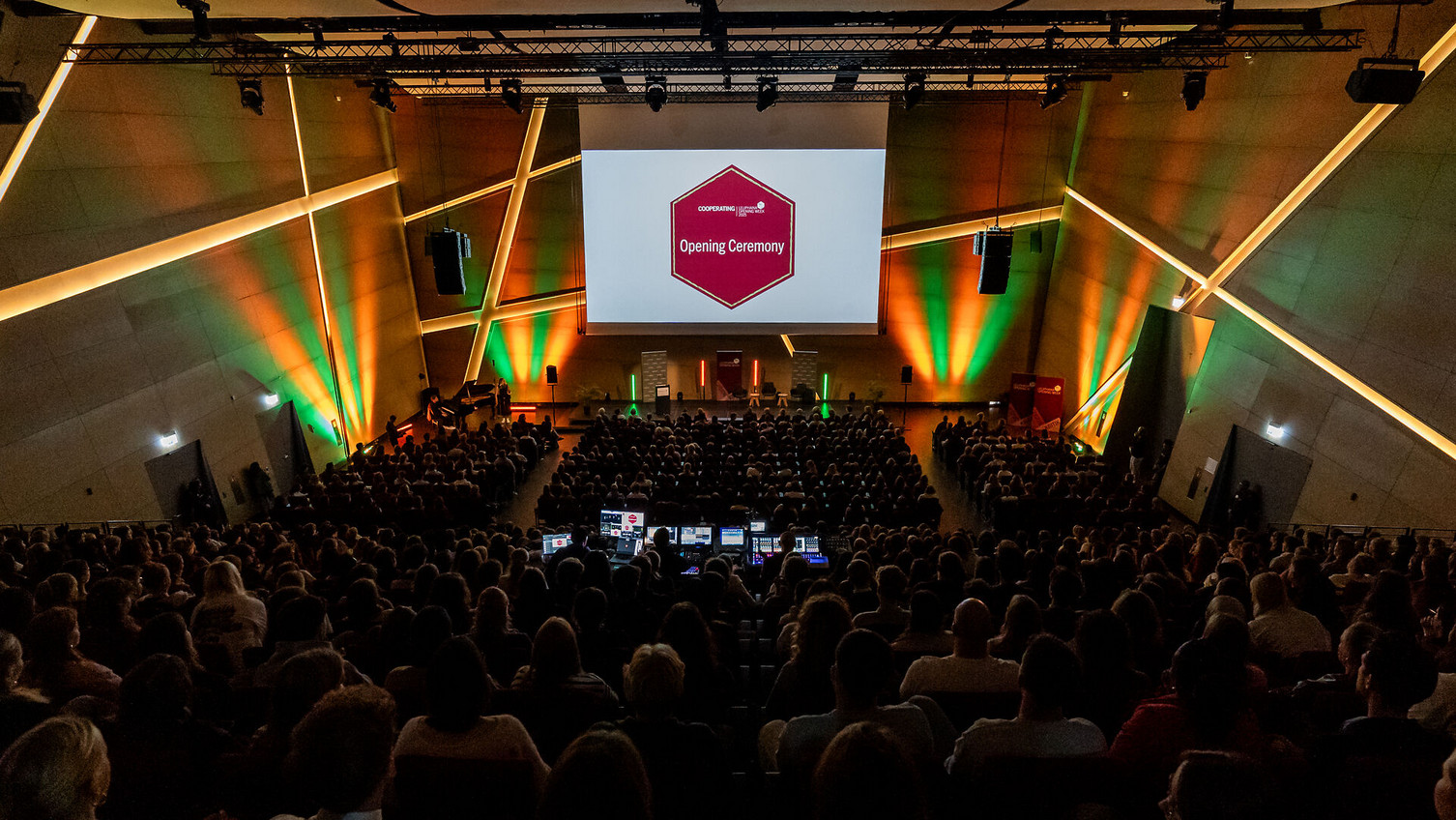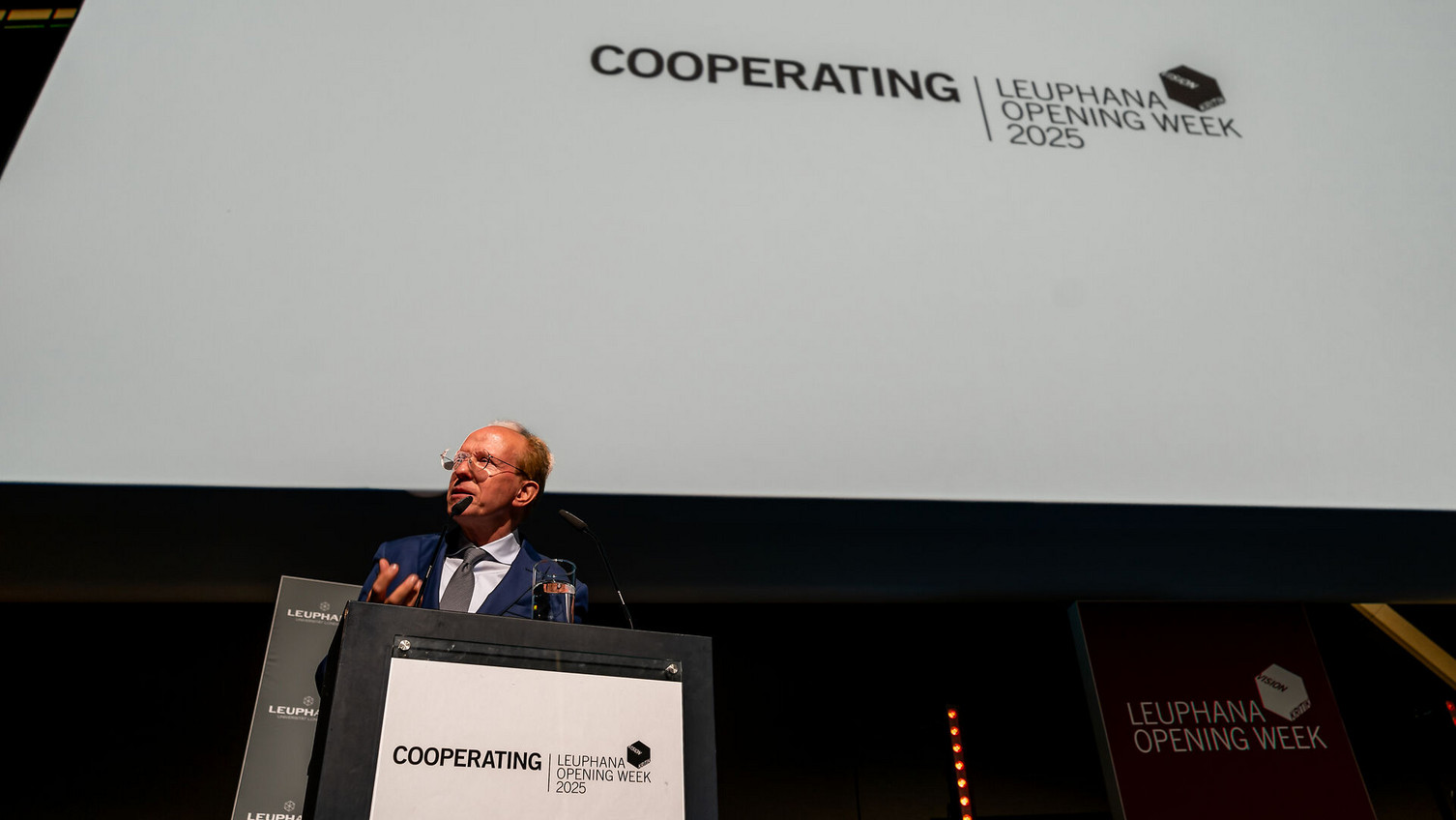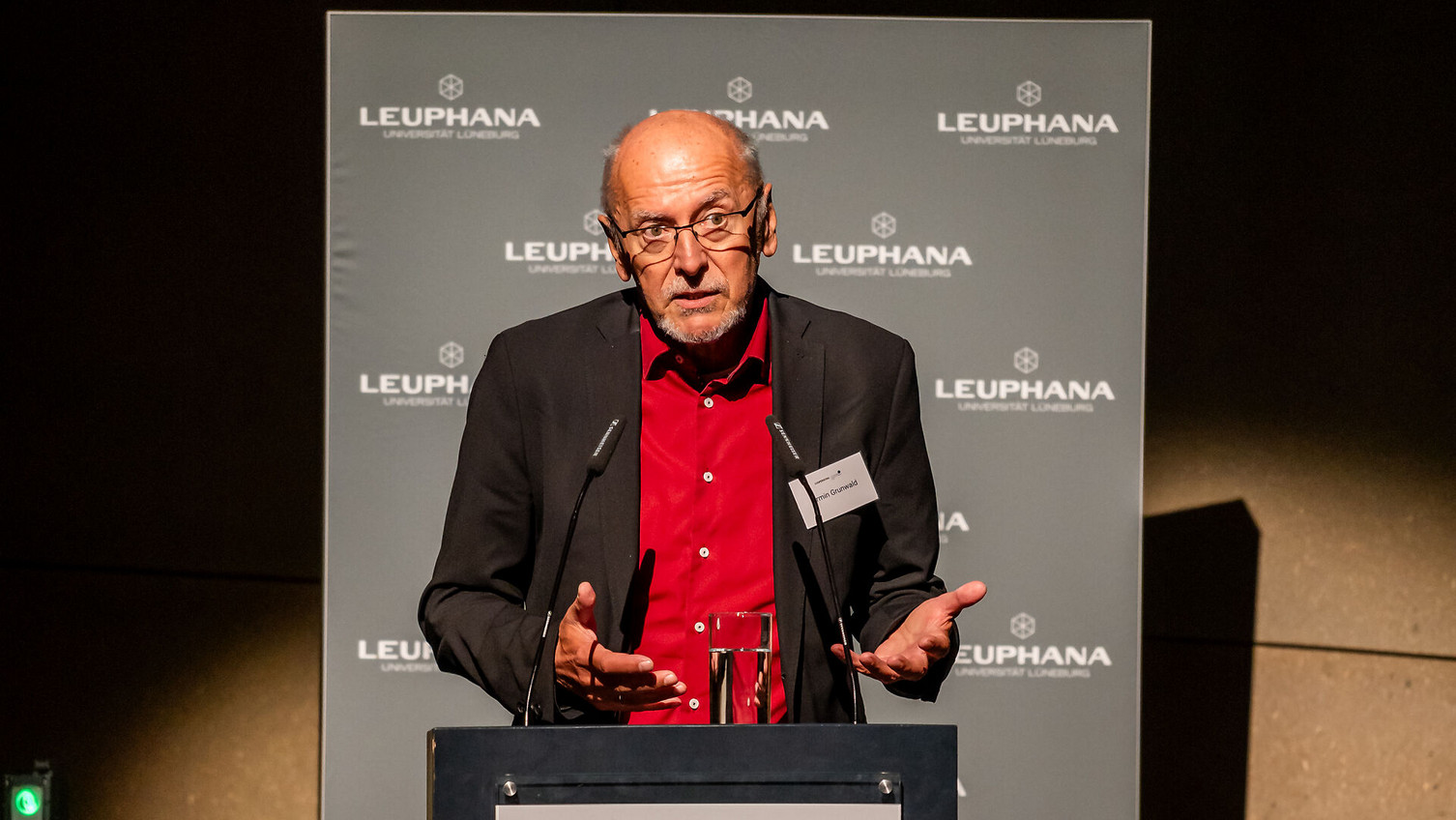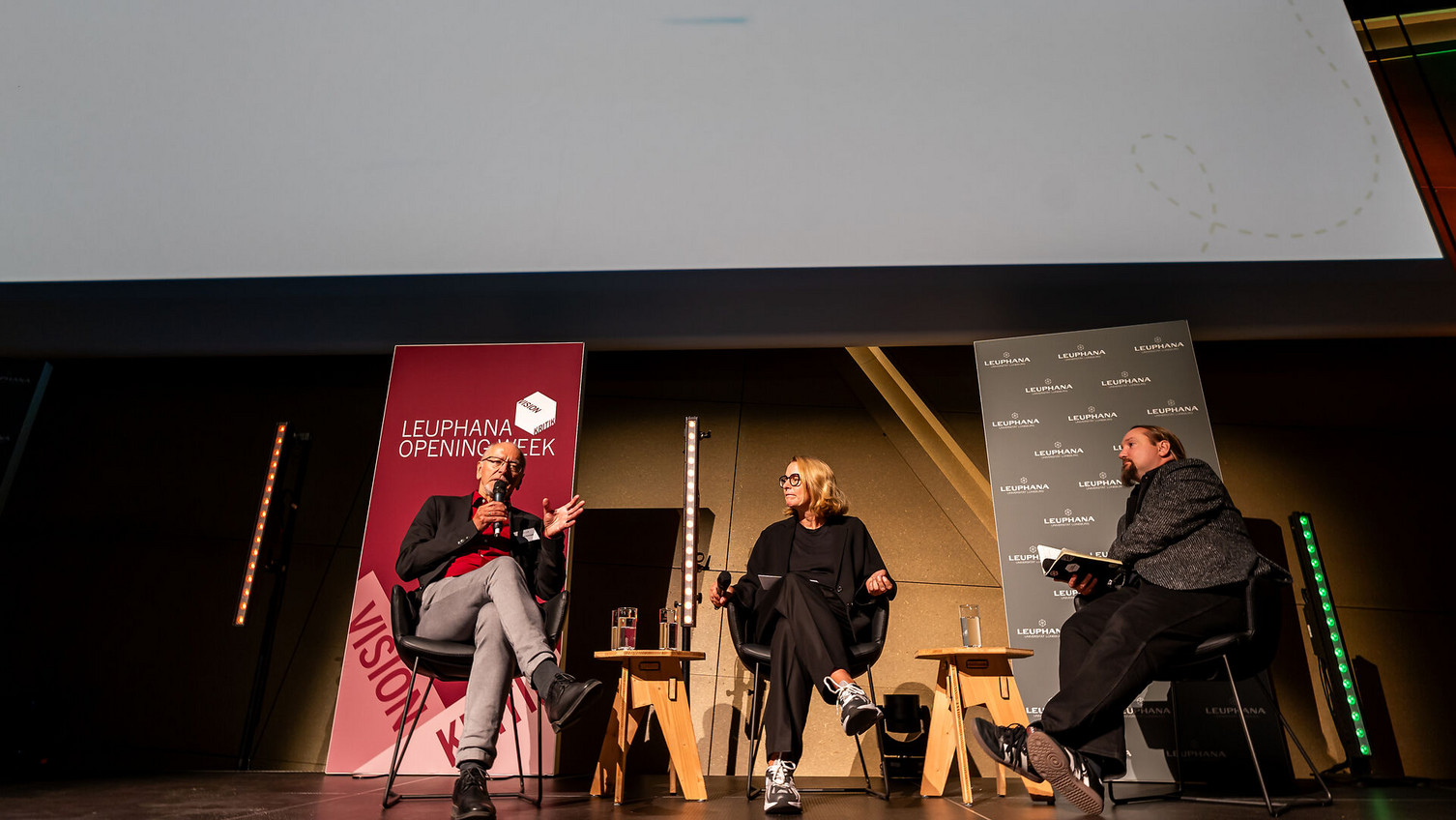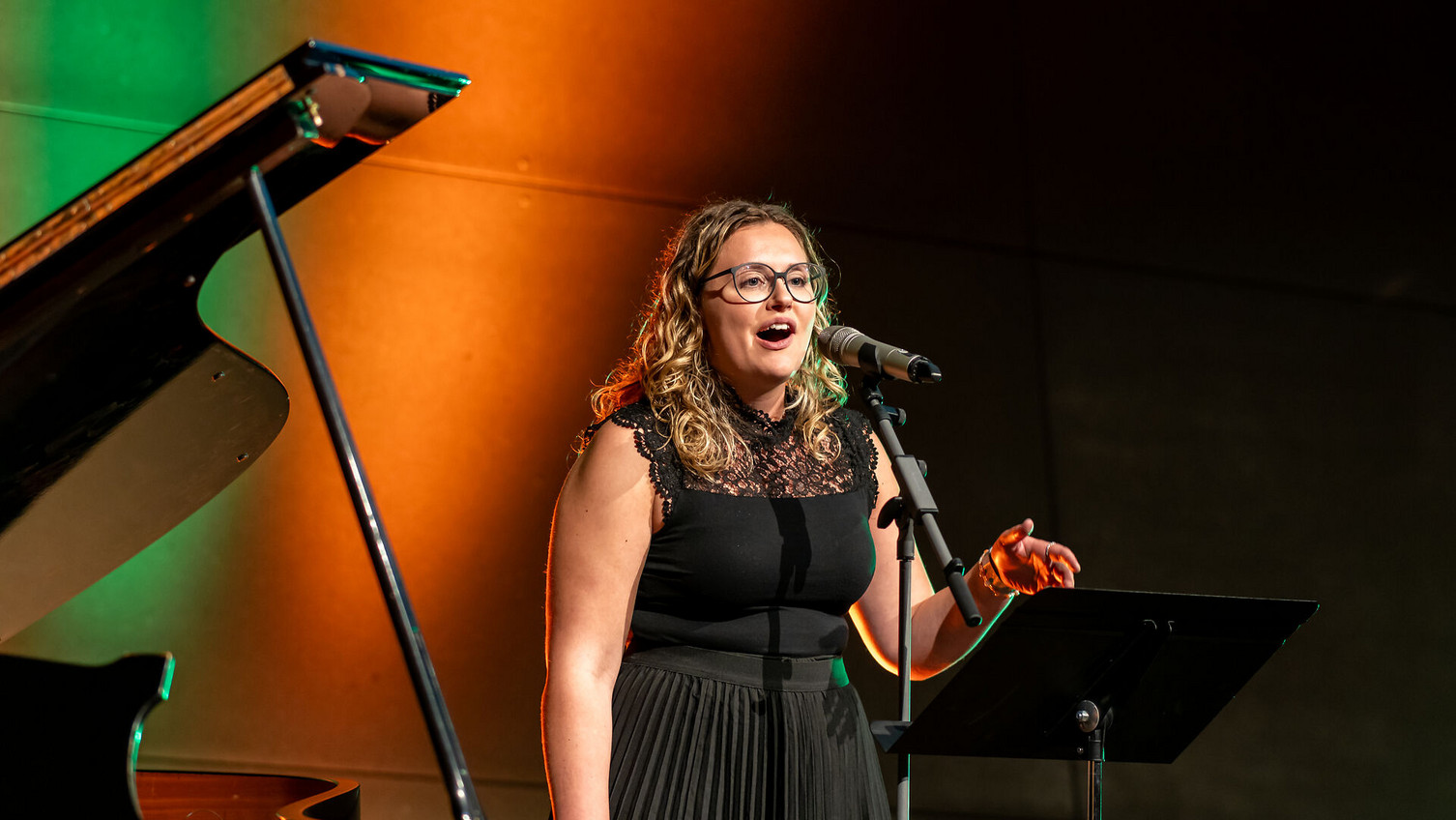Opening Week 2025: ‘Change your perspective’
2025-10-02 Leuphana University's unique study model requires all 1,500 first-year students to engage intensively with a socially relevant topic at the beginning of their studies. This year, the focus is on ‘cooperating’ – a fundamental principle of scientific work and a central driver of social development. The university welcomed renowned technology researcher Armin Grunwald as guest speaker to the opening ceremony in the central building.
The Libeskind Auditorium is filled to capacity. The new students turn around eagerly as a voice rings out from the upper rows of the hall: ‘Change your perspective,’ calls out Christian Brei, full-time Vice-President of the university, and asks: ‘Why are you here and not somewhere else?’
During the ceremonial opening of the semester, he sought dialogue with the new students: ‘This university is about trust. We trust that you have courage. To grow and to change something – even yourself – requires courage. You need courage to deal with exploration and insecurities.’ Many share their visions and explain why they chose to study at Leuphana: because of its focus on sustainability, the opportunity for interdisciplinary learning and its unique study model. An essential part of this model is the opening week, which goes far beyond a traditional orientation week and is part of the interdisciplinary Leuphana semester. ‘Opening Weeks means we want to encourage you from the very beginning to deal with academic methods and also with relevant academic topics,’ says Christian Brei.
In 90 project groups, students tackle a central question of our time: How can we act together, share knowledge and shape the future in uncertain times? The focus is on four topics: the origins of cooperation, the social shaping of innovation and artificial intelligence, science as a cooperative process of knowledge acquisition, and the question of what difference cross-border cooperation can make. As every year, the project work is accompanied by high-calibre stage talks and discussions.
The opening speech was given by technology researcher Armin Grunwald, advisor to the German Bundestag on issues of artificial intelligence: ‘What a great picture! For me, it is a personal great honour to be part of this opening ceremony because I have always admired the Leuphana system of this special first semester,’ said the doctor of physics, who later qualified as a professor of philosophy. Since 1999, he has headed the Institute for Technology Assessment and Systems Analysis (ITAS) in Karlsruhe – the largest institution of its kind in Germany and worldwide. In his speech and the subsequent discussion with Opening Week hosts Prof. Dr. Christina Wessely and Prof. Dr. Ricardo Usbeck, he emphasised how closely cooperation is linked to interdisciplinarity and transdisciplinarity: ‘In my institute, we have around 115 researchers: social scientists, economists, engineers, psychologists, legal or natural scientists. They all work together on a daily basis. But we also cooperate with stakeholders from outside science.’
Science should not become intrusive, Grunwald emphasised: ‘Science has no democratic mandate. We provide knowledge.’
University President Sascha Spoun also addressed the students with an urgent topic: artificial intelligence. ‘Let me be open and brief: if a position has been or will be replaced by AI, then there is something wrong with the position itself. It can only mean that the position was free from any creativity and free from the need to learn, to understand and to question things,’ said Sascha Spoun. He called for critical thinking – something that machines cannot do: ‘It never asks: Could I be wrong? In sum, even though AI can be extremely helpful, it is still miles away from being intelligent, not to speak of being smart.’ Those who think beyond simply passing exams during their studies need not fear AI: ‘If, however, studying means to you to understand a problem, to question a theory, or to try to find a solution, day by day you will do something which completely exceeds AI's performance.’
Lüneburg's mayor Claudia Kalisch recalled her own time at Leuphana, where she studied environmental sciences: "I know what great opportunities and experiences this university offers. You have something to look forward to,‘ she said, appealing to students to become politically active – especially at the local level: ’Democracy works when we work together.‘
AStA spokespersons Zoe Rauch and Helene Stephan also welcomed the first-year students. They called for cooperation and attitude: ’Learn from and with each other! Don't let anyone convince you your knowledge is worthless. Use your knowledge! Help each other!‘
The Vice-President of the College, Prof. Dr. Jelena Bäumler, encouraged students to take action and initiate change even in uncertain times: ’Uncertainty is also the possibility of a new beginning. We can reinvent ourselves; move into new directions. If we leave the old behind and enter new territory, it allows us to think differently. We must trust in ourselves."
The student duo Pia Buschmann (vocals) and Leander Lettermann (piano) delighted the audience with their music.
Other speakers during the orientation week included politician Gregor Gisy, science historian Kärin Nickelsen, cooperation and security researcher Mona Saleh, research director of the Munich Security Conference Tobias Bunde, developmental psychologist and primatologist Amanda Seed, and physician and philosopher Michael Hagner. A special highlight awaits students in the form of a performance by artist Daniel Simu, who will appear alongside his self-built dance partner Acrobot – a robot that moves artfully across the stage.

